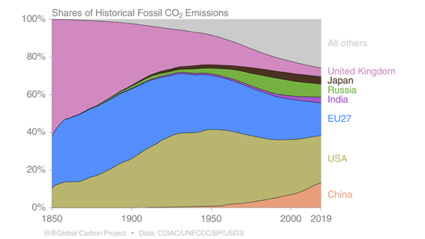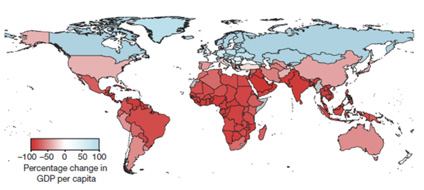The post-pandemic recovery is already becoming evident in many countries, but it needs to have a different sign: we cannot continue with the past energy model if we want to stabilize the planet's temperature at the 1.5◦ limit recommended by scientists. To this end, the world's major economies must stop being net emitters of greenhouse gases (GHG): this means, in short, that our economy must stop depending on fossil fuels (coal, oil, natural gas...) and start relying on low-emission energies, mainly renewable (hydro, biomass, solar, wind, geothermal) and, as long as a solid alternative is not possible, nuclear.
The latest report of the intergovernmental panel on climate change, published this summer, makes clear what the global warming trends are, observable not only in thermal records, but also in the massive melting of sea and continental ice masses (especially in the Northern Hemisphere), the reduction of glaciers, or the increasing presence of extreme anomalies (floods, fires, droughts...).
After several decades of scientific debate, it seems to me that it makes no sense to continue discussing aspects on which science has found enormous convergence. With the uncertainties that all scientific knowledge carries with it, it is necessary to move on to action, to turn more or less rhetorical statements into concrete facts and provisions. That is why I believe it is time to focus on the ethical aspects of climate change, because that is where we are encountering the main barriers to adopting the commitments that the seriousness of the problem requires.
Science has already done its job, although it obviously needs to continue to understand the problem better and help us adapt, and now we need to move on to moral commitments, to be translated into tangible and effective objectives. What are the ethical bases for action on climate change? I will summarize those that seem to me to be the most salient:
The first is an elementary precautionary principleThis leads us to avoid anything that could have serious effects, even if we were not certain that they would occur. A reasonable degree of knowledge is enough to avoid crossing lines that could lead to catastrophes. In the Earth Charter, approved at the UN in 1982, it was clearly indicated that: "Those activities that are likely to involve a risk to nature should be preceded by thorough verification; their proponents should ensure that the expected benefits far outweigh the potential harm they may generate, and when these effects are not fully understood, such activities should not be carried out" (United Nations, World Charter for Nature, Resolution 37/7, 1982, 11.b).
In short, to review the stakes and avoid actions that may cause considerable damage, even if such damage is only likely, it is an elementary principle of human behavior. Future warming scenarios carry with them sufficiently serious threats for us to take whatever action is necessary now to avoid them. We know that these models pose probabilistic simulations, but they are the best we have for action. It makes no sense to delay decisions because we are not sure what will happen. In that way, we would not have car or home or travel insurance, we would not have civil protection systems for catastrophes, we would not plan for the future, and we all do it in one way or another.
The second ethical principle is that of responsibility. Obviously, decisions to avoid an impact should be taken by those who have caused it. In the case of climate change, this means that responsibilities are global, since all countries have caused it in one way or another, but obviously they are differentiated, because most of the GHGs that now enhance the greenhouse effect in the atmosphere have been emitted by the most industrialized countries.
It is necessary to consider cumulative emissions, where industrialized countries obviously have the main weight. (see figure). This means that we cannot ask the same degree of sacrifice from countries that have just joined the group of net emitters (such as China or India) as from those of us who have been net emitters for many decades.
Pope Francis also mentioned this idea of differentiated responsibility in Laudato si: "For this reason, we must clearly maintain the awareness that in climate change there are diversified responsibilities, (...) There are no borders or political or social barriers that allow us to isolate ourselves, and for this very reason there is no room for the globalization of indifference" (Pope Francis, Laudato si, 2015, n. 52). In this sense, that the U.S. federal government has refused to contribute to climate change mitigation - disregarding what its own scientific community indicates - seems to me to be a deeply irresponsible attitude, although, it is also fair to say, the country as a whole has reduced its emissions over 1990 levels, mainly due to the action of state and local governments. Undoubtedly, the attitude of the U.S. will be one of the keys to the success of COP26, hoping that it will lead its own emission reduction commitments and the momentum for developing countries.

Responsibility also refers to the capacity to respond. It is precisely the industrialized countries that have the greatest capacity to make the necessary changes in our energy model and to help others to do so. This is another manifestation of shared responsibilities. Poor or developing economies cannot be asked to make the same effort as those that have a high standard of living, perhaps as a result of past emissions. In this regard, it is also worth considering per capita emissions as a key factor in the assumption of responsibilities. China is currently the leading GHG emitter, but its per capita rate is lower than that of the US, Canada or Australia. Moreover, in this ethical dimension, we have to consider that China, India or Brazil are emitting more for our own consumption. National emission balances take into account production, but not consumption. If each country were assigned the carbon footprint of the goods it consumes, ours would undoubtedly still be much higher than that of the emerging countries.
The third ethical dimension is intergenerational solidarity. Undoubtedly the most interesting element of the movement initiated by Greta Thunberg is to underline precisely this factor. We are heirs of those who came before us and we enjoy assets that are largely the fruit of their labor. We cannot now capriciously benefit from resources and energy that will be needed by those who will continue to live on this planet after our departure. It would be profoundly unfair.
It is precisely the industrialized countries that have the greatest capacity to make the necessary changes to our energy model.
Emilio Chuvieco
Although it is very difficult to estimate the economic impacts of future climate change scenarios, some economists have carried out this exercise based on the best climate models. The estimate shown in the figure assumes that most of the most vulnerable countries (tropical and temperate countries in the southern hemisphere) will be the hardest hit by the foreseeable changes (Fig. 2). Again, environmental justice requires more decisive action to prevent these effects from occurring.

Finally, it seems to me necessary to recover the impact of Aristotle's virtue ethics on this debate. Climate action can have many motivations: ethical responsibility or fear of catastrophe seem to be the most frequently invoked. It seems to me, however, that the most important is to appeal to the values that make us better.
We need to lead a more austere life because that will make us happier, knowing that we are sharing resources and energy with those who need it, with the most vulnerable people, with other forms of life and with future generations. Having more, consuming superfluously does not make us happier and also has negative impacts on other people and on ecosystems, which are necessary for our own existence. "The emptier a person's heart is, the more he or she needs objects to buy, possess and consume," Pope Francis reminded us in Laudato Si. It is not only a question of responding to a crisis, but above all of redirecting the values that guide our society, of generating a model of progress that places human beings, families and relationships between people at the center. I believe that deep down we all realize that the things that are really worthwhile in this life cannot be bought, and that a more frugal, closer model of life will not only help the environment, but also our own inner balance.
We have to lead a more austere life because that will make us happier, knowing that we are sharing resources and energy with those who need it, with the most vulnerable people, with other forms of life and with future generations.
Emilio Chuvieco
Professor of Geography at the University of Alcalá.











